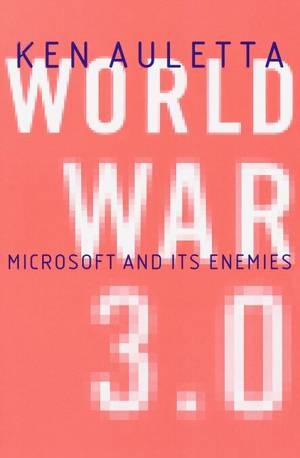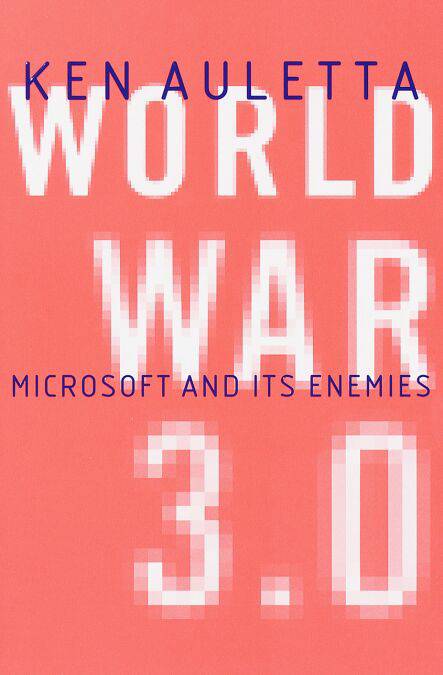
- Afhalen na 1 uur in een winkel met voorraad
- Gratis thuislevering in België vanaf € 30
- Ruim aanbod met 7 miljoen producten
- Afhalen na 1 uur in een winkel met voorraad
- Gratis thuislevering in België vanaf € 30
- Ruim aanbod met 7 miljoen producten
Zoeken
World War 3.0 E-BOOK
Microsoft, the US Government, and the Battle for the New Economy
Ken Auletta
E-book | Engels
€ 16,12
+ 16 punten
Omschrijving
The Internet Revolution, like all great industrial changes, has made the world's elephantine media companies tremble that their competitors-whether small and nimble mice or fellow elephants-will get to new terrain first and seize its commanding heights. In a climate in which fear and insecurity are considered healthy emotions, corporate violence becomes commonplace. In the blink of an eye-or the time it has taken slogans such as "The Internet changes everything" to go from hyperbole to banality-"creative destruction" has wracked the global economy on an epic scale.
No one has been more powerful or felt more fear or reacted more violently than Bill Gates and Microsoft. Afraid that any number of competitors might outflank them-whether Netscape or Sony or AOL Time Warner or Sun or AT&T or Linux-based companies that champion the open-source movement or some college student hacking in his dorm room-Microsoft has waged holy war on all foes, leveraging its imposing strengths.
In World War 3.0, Ken Auletta chronicles this fierce conflict from the vantage of its most important theater of operations: the devastating second front opened up against Bill Gates's empire by the United States government. The book's narrative spine is United States v. Microsoft, the government's massive civil suit against Microsoft for allegedly stifling competition and innovation on a broad scale. With his superb writerly gifts and extraordinary access to all the principal parties, Ken Auletta crafts this landmark confrontation into a tight, character- and incident-filled courtroom drama featuring the best legal minds of our time, including David Boies and Judge Richard Posner. And with the wisdom gleaned from covering the converging media, software, and communications industries for The New Yorker for the better part of a decade, Auletta uses this pivotal battle to shape a magisterial reckoning with the larger war and the agendas, personalities, and prospects of its many combatants.
No one has been more powerful or felt more fear or reacted more violently than Bill Gates and Microsoft. Afraid that any number of competitors might outflank them-whether Netscape or Sony or AOL Time Warner or Sun or AT&T or Linux-based companies that champion the open-source movement or some college student hacking in his dorm room-Microsoft has waged holy war on all foes, leveraging its imposing strengths.
In World War 3.0, Ken Auletta chronicles this fierce conflict from the vantage of its most important theater of operations: the devastating second front opened up against Bill Gates's empire by the United States government. The book's narrative spine is United States v. Microsoft, the government's massive civil suit against Microsoft for allegedly stifling competition and innovation on a broad scale. With his superb writerly gifts and extraordinary access to all the principal parties, Ken Auletta crafts this landmark confrontation into a tight, character- and incident-filled courtroom drama featuring the best legal minds of our time, including David Boies and Judge Richard Posner. And with the wisdom gleaned from covering the converging media, software, and communications industries for The New Yorker for the better part of a decade, Auletta uses this pivotal battle to shape a magisterial reckoning with the larger war and the agendas, personalities, and prospects of its many combatants.
Specificaties
Betrokkenen
- Auteur(s):
- Uitgeverij:
Inhoud
- Aantal bladzijden:
- 464
- Taal:
- Engels
Eigenschappen
- Productcode (EAN):
- 9780375506796
- Verschijningsdatum:
- 14/02/2001
- Uitvoering:
- E-book
- Beveiligd met:
- Adobe DRM
- Formaat:
- ePub

Alleen bij Standaard Boekhandel
+ 16 punten op je klantenkaart van Standaard Boekhandel
Beoordelingen
We publiceren alleen reviews die voldoen aan de voorwaarden voor reviews. Bekijk onze voorwaarden voor reviews.







